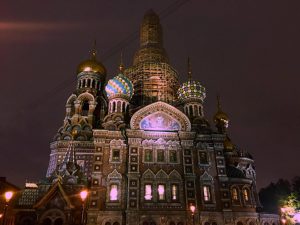By Parker Barry

St. Petersburg captures the meaning of melancholy: grey weighs on the city regardless of the sun’s presence. It makes sense that Dublin and St. Petersburg are two cities famous for their depressing poetry and prose. James Joyce, an Irish unapologetic alcoholic genius — starving from poverty and going blind from a condition called “Iritis” (a very painful inflammation in the colored part of the eye), wrote some of the best prose of the twentieth century and practically invented the stream-of-consciousness narrative style.
Last summer I studied in Ireland, read Joyce, and soaked in the deep sadness that the clouds drizzled from the sky. Both cities are perpetually dank and grey. I stared down the canals of St. Petersburg and I definitely felt the same melodrama that haunted me in Dublin.
These authors actually felt sadness. Gogol, a 19th-century Russian author, committed suicide by starving himself to death because he never achieved his well-deserved fame. He might have starved himself because he was practicing asceticism and was wildly depressed (a combination that contributes to mass amounts of self harm).
Starvation is not a pleasant way to die; the symptoms include seizures, shrinkage of the heart and lungs, swelling from fluid under the skin and chronic diarrhea. Gogol is most famous for his novel “Dead Souls,” which was supposed to be the first part of an adaptation of Dante’s “Divine Comedy.” Gogol ended up burning the second part to “Dead Souls” — he claimed this action was “a practical joke played on him by the Devil.”
This city St. Petersburg has a history of authors that were sent to Gulags — “corrective labor” camps established in Siberia under Stalin and Lenin — exiled, or banned from writing at all. One such person is Anna Akhmatova, who was forced to have friends memorize her poems line by line, the only copy hidden in their heads until they could escape Russia and publish them. I was trudging along the streets in my blue Patagonia raincoat on the verge of tears from being cold and wet while reading the Bronze Horseman. I cursed poetry and the clouds and I shifted my feet so they wouldn’t throb with pain.
Russia has seen sadness and devastation. During the siege of Leningrad (1941-1944), St. Petersburg lost 600 thousand people. That is more citizens to die in one war than all of the United States’ wars combined. In World War II, 20 million people died in the Soviet Union — soldiers as well as civilians. In the US, only 200 thousand died during World War II.
Although I cannot come close to comprehending this mass amount of tragedy, learning about the history of St. Petersburg has made me realize how suffering can translate into art. While Gogol wastes away in his bed, skipping meals, starving for fame, beauty can still pulse through the city through his prose.
